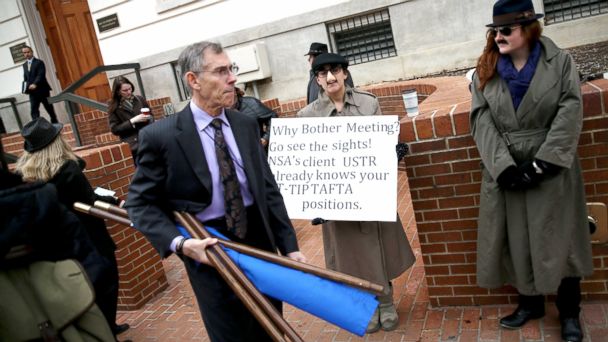What's Next for the Embattled NSA Surveillance Program

Mark Wilson/Getty Images
U.S. District Court Judge Richard J. Leon sent a stern warning to the government Monday when he ruled that a National Security Agency surveillance program is likely unconstitutional.
Just after barring the U.S. intelligence agency from collecting the personal data of two of the plaintiffs challenging the program, the judge agreed to suspend his order, "pending appeal," because of the "significant national security interests at stake."
RELATED: Obama to Meet With Tech CEOs Amid NSA Concerns
But he said he wanted to give "fair notice" that if his ruling is eventually upheld, the government should be ready to suspend the program immediately, at least as it applies to the two plaintiffs in the case.
"Requesting further time to comply with this order months from now will not be well received," Leon said of the case that includes conservative activist and Verizon Wireless subscriber Larry Klayman as a plaintiff.
Even at oral arguments in November, Leon acknowledged that no matter how he rules in the case, he was sure the issue would eventually make it to a federal appeals court, if not the Supreme Court of the United States.
Indeed, another federal judge, William H. Pauley III of the Southern District of New York, is considering a similar challenge to the program brought by the ACLU.
WATCH: Federal Judge Rules NSA Data Collection Unconstitutional
That case, in which Verizon customers American Civil Liberties Union and New York Civil Liberties Union are plaintiffs, was argued the same week as Leon's case. Pauley was nominated to the bench by President Bill Clinton.
At oral arguments in that case, ACLU lawyer Jameel Jaffer argued that in passing the USA Patriot Act, Congress never intended "to empower the government to collect information on a daily basis, indefinitely, about every American's phone calls."
Jaffer said the government had gone too far in wanting to track the associations of suspected terrorists. "You don't need to collect everything to do that," Jaffer said.
Besides the statutory arguments, the ACLU argued that the government's actions present substantial constitutional questions.
"Never before has the government attempted a program of dragnet surveillance on Americans on this scale and the constitutional questions that the program raises are therefore novel and profound," ACLU lawyer Alexander A. Abdo told Judge Pauley.
But when it was the government's turn, Assistant Attorney General Stuart Delery reminded the judge that the government, in the metadata program, "does not collect the content of any conversation, listen to any calls, or even collect the identifying information about customers or parties to the calls."
He said the program is authorized by statute and is constitutional, and that it has been "repeatedly approved by all three branches of government."
(In referencing the judicial branch, Delery highlighted the federal judges on the Foreign Intelligence Surveillance Court who authorized the program in secret.)
Delery said the ACLU has no legal right to be in court because its claims of injury are merely speculative. Judge Pauley asked few questions, but when Delery argued that Congress had been briefed on the program, the judge was quick to point out that Rep. Jim Sensenbrenner R-Wis., "a veteran congressman" had submitted a brief "in which he said he had no idea of what was happening."
At the end of the hearing, the Judge said simply, "I have a lot to think about."
It's unclear when Pauley will issue his ruling. So far Leon's is the only ruling on the books since Edward Snowden revealed the existence of the program earlier this year. Although Leon's opinion won't have an immediate impact because of the stay, it sent a strong message to the government.
"Its much bigger implication is the symbolism," American University Washington College of Law professor Stephen I. Vladeck said. "The message that a federal judge is finally pushing back, is finally saying to the NSA, 'No, in fact, mass collection of phone records without individualized suspicion is not legal.'"
And watching from Russia is Snowden. "Whatever individuals might think about Edward Snowden," Vladeck said, "there's no question that today's decision would not have been possible without him."